If your resolution is to read more great books this year, you’re in luck, as 2024 promises to be an exciting 12 months in the literary world. From the long-awaited return of big-name novelists and a raft of exciting debuts, to intriguing memoirs and thought-provoking non-fiction, here’s a taste of what’s to come.
More like this:
– 33 of the best books of 2023
– The raunchy books Britain loves
– The overlooked star of Orwell’s 1984
Big hitters
Several literary heavyweights – alive and otherwise – have new titles this year. In March, a “lost novel” from Gabriel García Márquez will be published 10 years after his death. The Nobel prize-winning author suffered from dementia while writing his final novel, Until August, and in his last days asked for it not to be published, but his sons have decided to release their “father’s last effort to continue creating against all odds”.
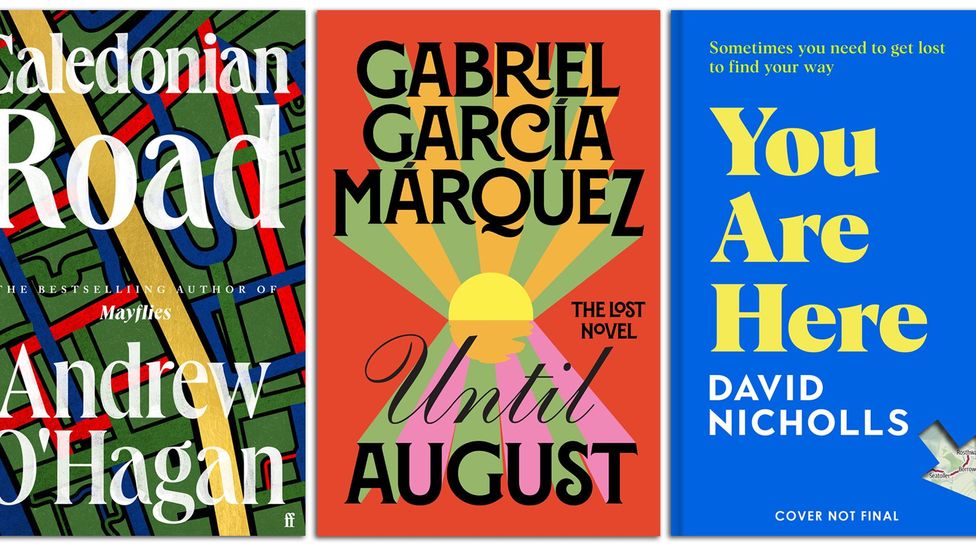
(Credit: Faber, Viking, Sceptre)
Spring also sees a new doorstopper from Mayflies writer Andrew O’Hagan. Caledonian Road is an ambitious state-of-the-nation novel set in north London that centres on the fall from grace of a famous academic and includes a huge cast of supporting characters. Fans of Colm Tóibín’s beautiful 2009 novel Brooklyn – adapted into a film starring Saoirse Ronan – will be delighted that there’s a sequel, Long Island
After Barbara Kingsolver’s hugely successful Demon Copperhead – a modern day reimagining of David Copperfield – comes another retelling of a classic tale in Percival Everett’s James. The hugely prolific US author has quietly been producing excellent novels for four decades, with 2021’s The Trees shortlisted for the Booker Prize, but his 24th might be his most anticipated yet. It tells the story of Mark Twain’s Huckleberry Finn from the perspective of the enslaved Jim.
Few contemporary writers make characters feel as human as David Nicholls does. It’s a big year for him – with an adaptation of his best-selling book One Day hitting Netflix in February – and his new novel You Are Here out in April. As plots go, it’s not the flashiest – two strangers take a long walk together across the north of England – but Nicholls has a knack for finding the magical in the everyday. It’s not a pandemic novel, but its themes of loneliness and clinging on to moments of connection feel particularly pertinent after the past few years.
In the summer, Elif Shafak returns with There Are Rivers in the Sky, an ambitious novel that spans different centuries and countries, following three characters, all outsiders and living near a river. Ali Smith always finds interesting ways to approach novel writing and for her next project, Gliff – out in October – she’ll hide a story within the book that will then form the basis of the next one, Glyph (out in 2025). Towards the end of the year, we’ll also get a new novel from writer Chimamanda Ngozi Adichie – her first in more than a decade. Entitled Dream Count, little is known other than it features four interconnecting stories.
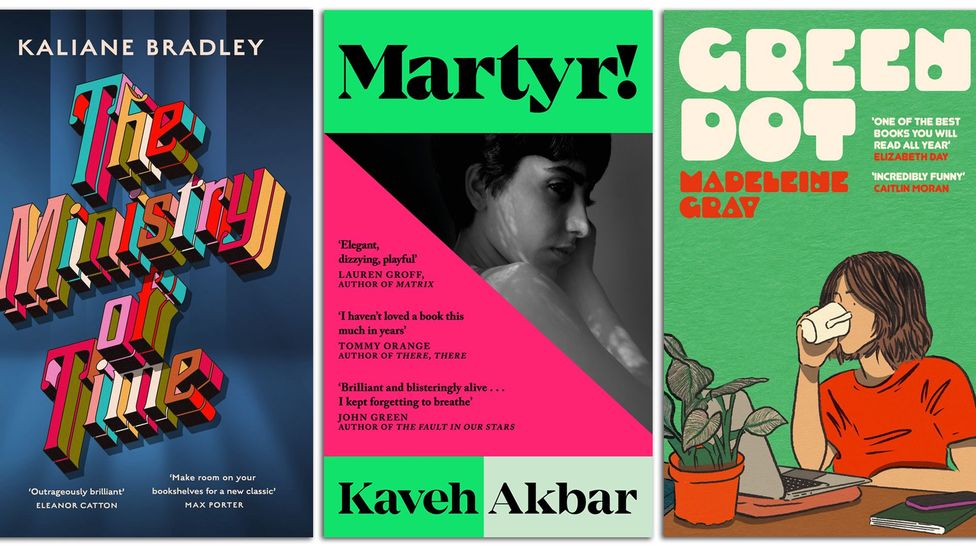
(Credit: Sceptre, Picador, Weidenfeld & Nicolson)
As well as familiar names, there are plenty of new voices on the horizon too. One of the year’s most exciting debuts is The Ministry of Time by British-Cambodian writer Kaliane Bradley. Out in May, it’s a genre-bending romcom about a Victorian polar explorer and a millennial civil servant who end up as housemates thanks to a government experiment in time travel.
Post-Fleabag, the “messy woman” trope has become rather ubiquitous in fiction, but Australian writer Madeleine Gray’s Green Dot – about a twenty-something who finds herself in a tedious job and an impossible relationship with a married man – manages to feel fresh. It’s full of incredibly sharp sentences and darkly comic moments. Another Antipodean debut making waves is Rebecca K Reilly’s Greta and Valdin, about two adult siblings both navigating hopeless love lives, helped and hindered by their eccentric family. Both are out in February.
It’s been a stellar few years for Irish literature and that looks set to continue. Wild Houses is a crime caper set in a small town in County Mayo and the first novel from celebrated short story writer Colin Barrett. Sally Rooney calls it “a book to live inside”. Sinead Gleeson is already an acclaimed essayist and critic, and her novel Hagstone – involving an artist, a remote Irish island and a secretive women’s commune – is an original and captivating tale about creativity, landscape and folklore. Another non-fiction writer making an anticipated fiction debut is Lauren Elkin, whose novel Scaffolding follows two couples living in the same Parisian apartment half a century apart.
Two acclaimed poets also make their fiction debuts this year. Iranian-American writer Kaveh Akbar’s novel Martyr! tells the story of an adult orphan of Iranian immigrants searching for the truth about his mother’s death. Meanwhile Andrew McMillan’s Pity examines masculinity across three generations of a South Yorkshire mining family.
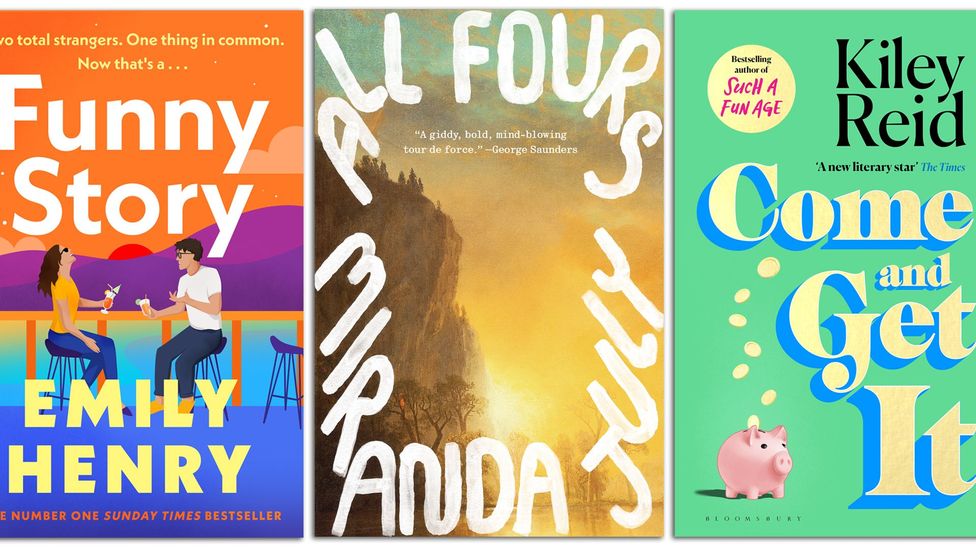
(Credit: Viking, Penguin, Bloomsbury)
Women writers have dominated the literary landscape over the past few years, and 2024 looks set to be another strong year for female voices.
Two writers who made waves with their debuts are back with anticipated follow-ups. Kiley Reid, whose 2020 book Such a Fun Age was a commercial and critical hit, returns this month with Come and Get It, a campus novel that tackles the financial anxieties of young women – and what people are prepared to do for money. Fans of Nigerian author Abi Daré’s debut The Girl with the Louding Voice will be pleased to know that its protagonist Adunni is also a character in Daré’s new book, And So I Roar, out in August.
A new Sarah Perry book is always a special event, and in May the author of The Essex Serpent and Melmouth returns with Enlightenment, a story of two friends told across 20 years that explores love, faith and astronomy. Filmmaker, artist and writer Miranda July’s second novel All Fours comes a decade after her first, and is her unique take on the female mid-life crisis, featuring a 45-year-old artist who embarks on a short-lived road trip and a journey of self-discovery.
Clare Chambers’ 2020 novel Small Pleasures, a tale of quiet suburban lives in the 1950s, was a word-of-mouth success story during the lockdown. Her follow-up Shy Creatures is set in the 1960s, and again focuses on seemingly ordinary people – an art therapist and her married lover – whose lives are upended by unexpected events.
In the summer Rachel Cusk, author of the Outline trilogy, returns with her new novel, Parade. A story of “art, womanhood and violence”, it’s told in a new style of voice that is “on the border between fiction and reality”.
Finally, if you’re in the mood for love, then the queen of romance Emily Henry is back with a new book in April. Funny Story is described as a “happily ever after that wasn’t”, about what happens when two heartbroken strangers become roommates and, inevitably, more.
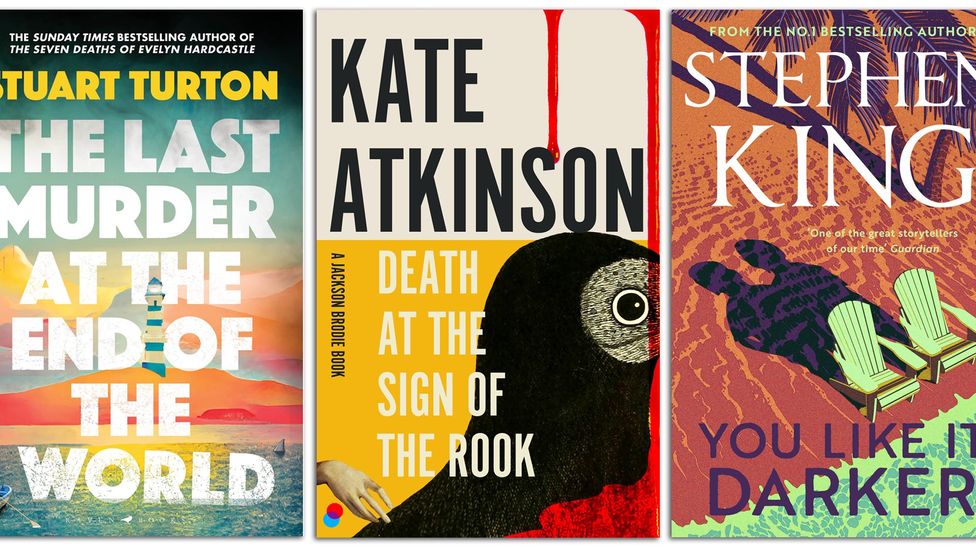
(Credit: Bloomsbury, Penguin, Hodder)
Tana French fans – and anyone who loves dark, atmospheric mysteries – can rejoice, as the writer returns in March with The Hunter, a sequel to 2020’s The Searcher. Set in a small village in west Ireland, French says it’s a novel about revenge and families, both the ones we are born with and the ones we create.
Fifty years since he published his first novel Carrie, Stephen King has a new short story collection out in May entitled You Like It Darker. The clue is in the name, with these tales probing at the disturbing underbelly of ordinary life.
Stuart Turton, author of the mammoth-selling Seven Deaths of Evelyn Hardcastle, returns in March with a post-apocalyptic murder-mystery, The Last Murder at the End of the World. In late summer there will be a new instalment in Kate Atkinson’s much-loved Jackson Brodie detective series. Death at the Sign of the Rook pays homage to the of detective fiction, Agatha Christie, and sees Brodie marooned in an old country house during a snowstorm with an eclectic cast of characters.
If you like your crime a little cosier, then the reigning king of the genre, Richard Osman, will launch a new series in the autumn, swapping his retirement home amateur sleuths for a brand-new detective duo. Osman has also been bigging up a new crime writer, Jonny Sweet, whose debut The Kellerby Code comes out in the spring and has been described as a Patricia Highsmith meets Donna Tartt.
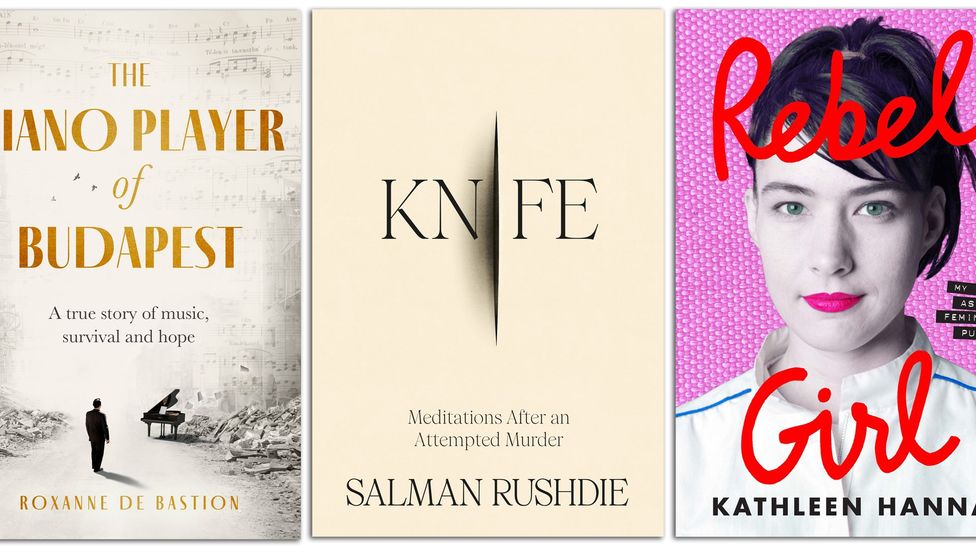
(Credit: Little Brown, Penguin, HarperCollins)
If 2023 was the year of big-name biographies, from Prince Harry and Pamela Anderson to Britney Spears and Barbra Streisand, 2024 looks to offer a more interesting and offbeat mix of life stories.
Two writers whose lives changed dramatically in 2022 share their harrowing experiences in new books. Salmon Rushdie’s Knife – out in April – details the attack on his life at a literary event that left him without sight in one eye. The novelist Hanif Kureishi, author of The Buddha of Suburbia, suffered a fall in Rome in December 2022 that left him unable to use his hands, arms or legs. His memoir Shattered – published in the autumn – describes how he adjusted to “becoming another person”.
Essayist Leslie Jamison’s writing is aways compelling, and in February she publishes her first memoir, Splinters, which explores motherhood, marriage, grief and art. Coming this summer, The Piano Player of Budapest is the story of how singer songwriter Roxanne de Bastion found a cassette recording of her grandfather playing piano that sent her on a journey to find out how he turned to music to survive the horrors of the Holocaust.
On the celebrity side, Ru Paul’s The House of Hidden Meanings (March) recounts his life, from growing up queer and black in San Diego through to becoming an international drag superstar and cultural icon. Two hugely influential female musicians also have memoirs out this year. In May there’s Rebel Girl: My Life as a Feminist Punk by Bikini Kill and Le Tigre front woman Kathleen Hanna, and coming in September, A Thousand Threads by pop icon Neneh Cherry.
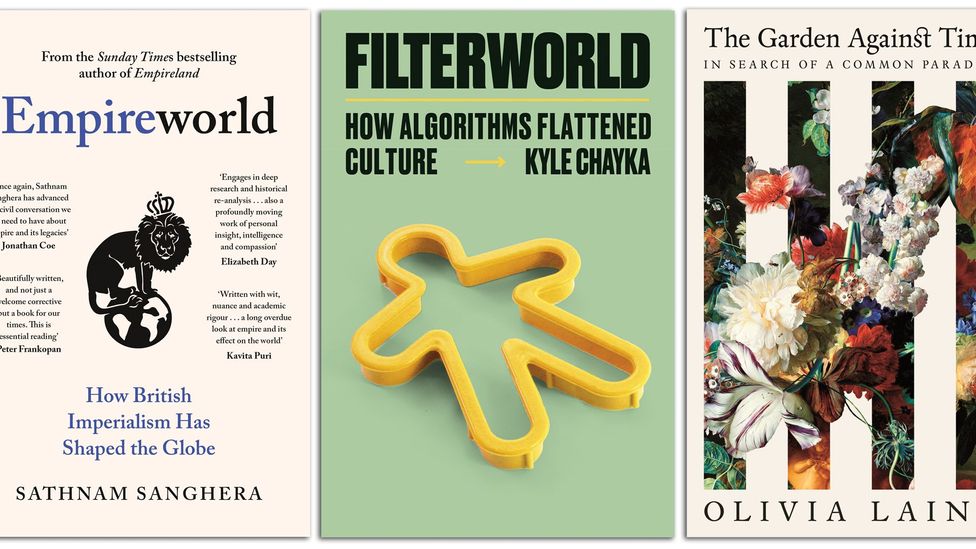
(Credit: Viking, Penguin, Macmillan)
As always, the scope of non-fiction books set for publication this year is wide-ranging in both genre and subject matter, so this is just a small taste of what’s to come.
Two major new books look at how artificial intelligence is changing all our lives. In Filterworld (January), New Yorker staff writer Kyle Chayka concentrates on how algorithms are shaping our culture and narrowing our experience of the world. In Code Dependent (March), Financial Times journalist Madhumita Murgia explores what the rise of AI means for us as a society by looking at the impact it has on nine ordinary people around the world.
Following on from his bestselling Empireland, author and journalist Sathnam Sanghera continues his examination of Britain’s colonial past with Empireworld (January), exploring its legacies around the world. In her book Private Revolutions: A Coming of Age Story (May), journalist Yuan Yang looks at life in modern China through the lives of four women in the 1980s and 1990s, all dreaming of a brighter future.
Olivia Laing’s previous non-fiction books have seen her explore subjects including loneliness, alcoholic writers, rivers and the human body. For her new one The Garden Against Time, out in May, she starts closer to home – in her walled garden in Sussex – and from there begins an investigation into the pleasures and possibilities of gardens.
Another writer exploring a subject close to her heart is renowned NPR music critic Ann Powers. Travelling: On the Path of Joni Mitchell (March) looks at the life and career of Joni Mitchell through her many journeys, musical and otherwise.
Lauren Oyler has a reputation as a fierce literary critic, so it makes sense that her first collection of essays, No Judgement (March) explores the role of cultural criticism in modern society. It’s followed in April by Like Love, a collection of essays on art and artists from Maggie Nelson, author of Bluets and The Argonauts. Nelson’s genre-busting writing has won her many devoted fans, as has that of author Deborah Levy, who also has an essay collection out this year – though we’ll have to wait patiently until the autumn for that one.